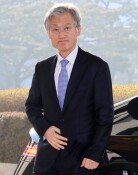[Editorial] We Want to Know
The South Korean Ministry of Defense has begun a series of talks with U.S. military officials to discuss various issues including the moving of the U.S. army base in Yongsan to another location. This behavior is cause for concern. The ministry reportedly had all the South Korean representatives for talks to certify the extent that they would not reveal any information in part or in whole on behalf of national interest and security, and that they would receive whatever punishment the law imposes on them if they breach this obligation.
In other words, the ministry has issued a gag order. Thus, the public would not know anything other than what is announced. The Defense Ministry explains that this certification is designed to reduce the possible side effects from publication of unconfirmed reports. On the contrary, if it really wishes to "cut down" on the side effects, it should actively encourage dissemination of the facts.
The national security and the safety of all South Koreans will be significantly influenced by the "re-balancing" drive: moving the Yongsan base and the repositioning of the U.S. 2nd Infantry Division. The move is also significant in terms of economic effect. To move the base to another location, hundreds of millions of dollars will have to be poured in to the project. Furthermore, the decision cannot be made without hearing the opinions of area residents who will newly accommodate the base. That is why the decision should not be made behind closed doors by a handful of representatives.
The United States and South Korea have reportedly agreed to move the base as early as possible, and reorganize all U.S. forces stationed in Korea. But we do not know anything about when this will happen and what will occur to the division which constitutes the core of the U.S. forces in Korea. We have already heard that the army would move far south, below the Han River, making most South Koreans worry about the future. It is not right, under these circumstances, for the government to keep silent about this matter.
We have also heard that the South Korean army would take more active role in defending the nation. This should be discussed publicly, too. Our citizens worry that dwindling war deterrence caused by changes in the U.S. military structure would cause undue burden on ordinary citizens.
It is impossible to persuade South Korean citizens when their right to know is ignored and when the government lets the public know only what it wants them to know. If the government does not want to force-feed the public of its final decisions, it should accommodate various voices from the public and, thereby, pursue changes based on public consensus.





![[천광암 칼럼]장동혁은 대체 왜 이럴까](https://dimg.donga.com/c/138/175/90/1/wps/NEWS/IMAGE/2026/02/22/133399127.1.jpg)

